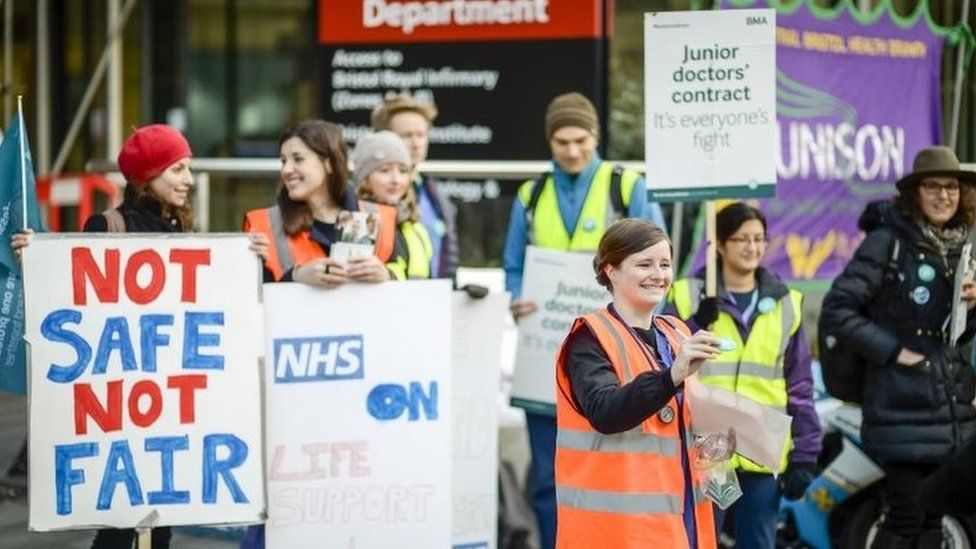Health
Welsh Government accepts pay recommendations amidst ongoing disputes

THE WELSH GOVERNMENT has accepted pay recommendations from independent review bodies for public sector workers, including NHS staff, teachers, and civil servants, for the 2024/25 financial year. The decision will see doctors and dentists receive a 6% pay rise, alongside a £1,000 consolidated uplift for junior doctors, while teachers and NHS staff will get 5.5%.
First Minister Eluned Morgan acknowledged the importance of public sector workers, describing them as the “backbone” of Wales. She emphasised the government’s commitment to fair pay while recognising public demand for improvements in services, particularly in the NHS and education. Cabinet Secretary for Finance Rebecca Evans highlighted the challenges of balancing fair pay with financial pressures.
The announcement has been cautiously welcomed by unions such as BMA Cymru Wales. Dr Oba Babs-Osibodu and Dr Peter Fahey of the BMA’s Welsh Junior Doctors Committee praised the 6% pay award as a step forward, but reiterated their calls for full pay restoration after years of real-term wage erosion. Meanwhile, Dr Stephen Kelly, chair of the Welsh Consultants Committee, recognised the progress made but expressed concerns that the settlement did not fully address years of undervaluation.
The response from general practitioners (GPs) has been more critical. Dr Gareth Oelmann, chair of the BMA Cymru Wales GP Committee, pointed out that while the pay increases were positive, they do not address deeper funding issues within general practice. He highlighted that over 100 GP surgeries had closed since 2012 due to financial constraints, and called for urgent GMS contract negotiations to tackle these systemic problems.
This latest announcement comes after significant industrial action by healthcare professionals earlier this year, with junior doctors leading the charge for fairer wages. The strikes, which resulted in widespread disruption to services, underscored the growing frustration within the medical community over years of pay stagnation.
While the pay increases for 2024/25 represent progress, the BMA and other unions remain steadfast in their pursuit of full pay restoration. They argue that, despite recent gains, doctors and healthcare professionals have seen their wages eroded in real terms over the past decade.
Beyond healthcare, teachers and other public sector workers have also benefited from the pay awards. Teachers will receive a 5.5% increase, reflecting the Welsh Government’s broader commitment to rewarding essential workers.
However, the Welsh Government faces the challenge of maintaining these pay awards while navigating broader economic constraints. Public finances remain under pressure, and there are concerns about how sustainable these pay settlements will be in the long term.
As the Welsh Government moves forward with these pay reforms, further negotiations with unions will be crucial to ensuring the long-term viability of public services in Wales. Despite the positive reception of the pay awards, there are still significant hurdles ahead, particularly in general practice and other underfunded areas of the public sector.
The pay increases mark a step towards resolving disputes, but the Welsh Government and public sector unions acknowledge that much work remains to address long-standing concerns around pay, working conditions, and service delivery.
Responding to the Welsh Government’s acceptance of the independent Pay Review Bodies recommendation of an above current inflation rate pay increase for NHS staff, director of the Welsh NHS Confederation Darren Hughes said:
“Health leaders will welcome the confirmation from the Welsh Government that those staff working so hard across the health service will benefit from an above inflation pay rise, in line with the UK Government offer to staff in England.
“NHS staff work tirelessly day in day out for patients and are the lifeblood of the health service, so this decision should be greeted with renewed optimism. Commitments to updating pay points and structures, as well as the intent to negotiate a fair and proportionate pay uplift across primary care, will also be welcomed.
“Industrial action has taken a real toll on the health service in recent years, not least on patients due to the cancellation of appointments and operations. We hope today’s news takes us another step towards avoiding disruption to health services from industrial action.
“However, it is crucial that the pay award is funded in full by both the UK and Welsh governments as the NHS continues to work hard at recruiting and retaining staff and driving down waiting lists against the backdrop of an already very tight financial position.
“Although NHS leaders understand the financial uncertainties faced by the Welsh Government, they would welcome an earlier decision in relation to future pay awards.
“NHS organisations will now work hard to implement the back-dated pay award, so staff can receive the well-deserved pay uplift as soon as is practicable.”
RCN Wales Executive Director Helen Whyley said: “The RCN today welcomes the Welsh government announcement that it will implement the recommendations of the independent pay review body (PRB) for NHS Agenda for Change staff in Wales. Nursing staff have been eagerly awaiting the Welsh government decision since early July, which applies from April 2024.
“The PRB recommendations acknowledge the tireless dedication and essential role of nursing staff, but investment in NHS staff is imperativeto fully reflect their contributions and to make the profession attractive to future nurses.
“Last year the Welsh government made a commitment to pay restoration for NHS staff. Now they must decide how to achieve that over time. The RCN expects to see a clear route to fair pay restoration – making up for a very serious loss of earnings in the last 15 years.
“Stagnant salaries at a time of spiralling prices have forced too many to leave nursing and deterred others from joining. Fair pay is vital to recruiting and retaining nursing staff, to filling the thousands of vacant nurse jobs and giving people the care they deserve.
“Nurses are the ever-present, safety critical workforce across the whole of health and care. Our wages do not reflect that, and still won’t after today. We will be pushing the Welsh government to show us their plans for improving NHS pay – it is vital to recruit and retain nursing staff. We will consult with our members on whether they see today’s statement as enough of a start on this pay journey.”

Health
NHS Wales app gives tutor fresh start after mental health struggles

A TUTOR who struggled with depression and anxiety found “life-changing” online support through a free NHS Wales service.
Former maths teacher Iain Messenger had experienced anxiety for decades but said looming retirement and the collapse of his marriage were the final straw.

He called the NHS 111 press 2 mental health service after experiencing crippling panic attacks, low self-esteem and ‘dark thoughts’.
He was signposted to SilverCloud Wales, an online platform offering guided self-help programmes for mental health and wellbeing.
Speaking out to coincide with Time to Talk Day – the nation’s biggest mental health conversation – 58-year-old Iain said: “The sense of hopelessness dissipated almost immediately.
“I realised I wasn’t the only one – other people were dealing with the exact same problems and feelings. I no longer felt alone.”
The former teacher, who lives near Welshpool, decided in 2024 to quit the classroom and focus on private tutoring.
But handing in his notice coincided with a marital breakdown, and he began each day of his final months in work battling panic attacks.
“I was struggling with my close relationships, and basic decision-making always turned into a drama,” Iain explained.
“I felt useless, wandering about not able to focus on anything. I couldn’t even read a book or watch the TV.
“I had some pretty dark thoughts – that I was a disaster, and no use to my family. I was in a real mess.”
Iain said seeking help through 111 press 2 in June last year was a ‘huge’ and ‘humbling’ step.
“It’s a bloke thing – you put on a front and pretend you’re OK,” he explained. “And I was typical in that regard, I wouldn’t really speak to anybody.
“You feel like the only person in the world who can’t do life, but then when you phone 111 press 2 and they go through the list of questions, it’s instantly relatable. You realise you’re not the first person to be there.”
Iain was referred for counselling but was advised to try SilverCloud while he waited for an appointment.
The platform features online courses based on cognitive behavioural therapy for issues including depression, anxiety, poor sleep and stress.
Access is free to anyone in Wales aged 16 or over, without seeing a GP.
“I was sceptical at first,” Iain admitted. “I just couldn’t see how an online platform was going to work, I thought I needed someone to press the right buttons and fix me.
“But going through the programme, there were scenarios that described exactly how I was feeling. I identified with so much of what was being said.
“And I was now actively doing something to get well. Just having a plan in place meant I went almost immediately from hopeless to hopeful.”
SilverCloud Wales is managed by NHS Wales’ Online CBT Service, based at Powys Teaching Health Board.
Over 41,000 people have accessed the Wales-wide service since it piloted in Powys in 2018.
As well as programmes for adults, the platform has courses for students and young people, and for parents supporting children and teens with anxiety.
SilverCloud’s three most popular programmes – addressing anxiety and depression – are also available in Welsh.
Online CBT Service project manager Fionnuala Clayton said: “Time to Talk Day reminds us how important it is to speak up when you’re struggling – it’s often the first step to feeling better.
“But we know that isn’t always easy, and that’s where SilverCloud can help. It offers flexible, confidential support you can access straight away, without waiting for a GP appointment. We’re delighted to see the difference it’s made to Iain’s life.”
Iain added: “I’m still using the lessons I picked up through SilverCloud, and they’re becoming more embedded in my thinking.
“I’m grateful – on a daily basis – for the things I learned. It’s been lifechanging.”
Sign up to SilverCloud at: nhswales.silvercloudhealth.com/signup
Cover image:
Former maths teacher: Iain Messenger
Health
Charity urges end to detaining autistic people in mental health hospitals

Welsh campaigners say new law could free dozens from inappropriate units and save up to £14m a year
THE NATIONAL AUTISTIC SOCIETY CYMRU is urging the next Welsh Government to introduce an Autism and Learning Disability Bill to prevent autistic people being unnecessarily detained in mental health hospitals, warning the current system is both harmful and costly.
Around 140 autistic people and people with a learning disability from Wales are currently being held in mental health units, despite campaigners saying such settings are unsuitable for most.
Families and advocates report repeated concerns including abuse, overmedication, excessive restraint and solitary confinement.
The charity says many people remain detained for years rather than months, with the average stay approaching five years. Placements are often far from home, leaving relatives facing long journeys to visit loved ones and making it harder to maintain family support.
Campaigners argue that failures in existing laws and weak duties on public bodies mean families struggle to challenge decisions or secure appropriate community care.
Community care cheaper
The organisation says keeping people in hospital is also significantly more expensive than supporting them locally.
Community support can cost from around £13,000 a year for those living with friends or family, rising to about £80,000 for supported accommodation. By contrast, the average inpatient placement costs about £214,000 per person each year.
Even the most intensive community packages are estimated to be between £130,000 and £200,000 cheaper annually than hospital care.
If the number of people in hospital units were halved, the charity says Wales could save between £9 million and £14 million a year.
However, it argues those savings will not be realised without new legislation to reform how services are planned and delivered.
‘Stolen lives’
Through its Stolen Lives campaign, families have shared accounts of relatives who they believe could have remained in the community with the right support, but were instead sectioned when local services broke down.
The charity says hospital should be a last resort, not the default when care systems fail.
It is calling for a dedicated Autism and Learning Disability Act that would:
– strengthen legal rights to support
– improve coordination between services
– increase accountability when systems fail
James Radcliffe, External Affairs Manager for the charity in Wales, said: “The next Welsh government has the opportunity to end the unnecessary detention of autistic people. Currently existing laws are failing to protect autistic people.
“Families are unable to challenge services to allow them to bring their loved ones home.
“An Autism and Learning Disability Bill could end this injustice and end this human rights failure. It would strengthen the protections and rights for autistic people and people with a learning disability and it would also save the taxpayer millions.”
Health
The growing popularity of overseas medical care

With waiting lists ever increasing and appointments seemingly booked up forever, more and more people are seeking alternative methods to get the medical care they need. While going private is an option for some, for others, the costs are simply too high, treatments are not specialised enough, or waiting lists remain lengthy. This is why many people are starting to go abroad for their treatment needs. So, with that in mind, let’s explore why overseas medical care has grown in popularity.
Shorter wait times
In 2024, more than 500,000 Britons chose to get treated abroad to avoid lengthy wait times on the NHS, more than double compared to numbers reported in 2021. With waiting lists continuously on the rise, it’s becoming increasingly difficult for people to get the treatment they need when they need it. The result is more and more people heading overseas to receive the right medical care.
Lower costs
The expense of going private in the UK versus going private abroad is significant. For example a hip replacement in the UK costs around £12,000 to £18,000 privately, but will cost around £1,600 to £5,000 in India. These reduced expenses make medical care more accessible to those on lower incomes, increasing the appeal of overseas medical care.
Specialised treatments or experimental therapies
Some countries have dedicated more time and effort into certain health conditions than others. For example many people seek epilepsy treatment in Germany, thanks to the country’s reputation for advanced investment into the condition.
Some tests, treatments, and experimental therapies aren’t available in the UK, causing people to venture further afield to make progress with their health.
Easier access to information
Thanks to technology like the internet and social media, it’s now easier than ever to research practices, facilities, and treatment options in different countries. Those who are dubious about going abroad for medical treatment, can now get the reassurance they need to go ahead.
And it’s not just the treatment itself, but the travel and accommodation, too. It’s never been easier to compare prices for airplane tickets, hotels, and transfers, making the entire process straightforward.
What does the future of medical care look like?
It’s evident that for Brits, going overseas is becoming increasingly popular. As NHS wait times and private costs increase, the appeal of treatment overbroad will likely continue to rise.
-

 Crime4 days ago
Crime4 days agoSex offender jailed after living off grid in Pembrokeshire and refusing to register
-

 Health3 days ago
Health3 days agoHealth board targets rise in steroid and gym drug use across west Wales
-

 News5 days ago
News5 days agoPrincess of Wales visits historic Pembrokeshire woollen mill
-

 Crime3 days ago
Crime3 days agoTeacher injured and teenager arrested for attempted murder at Milford Haven School
-

 Crime5 days ago
Crime5 days agoHakin man’s appeal delayed again as Crown Court seeks guidance on insurance law
-

 Crime6 days ago
Crime6 days agoArrest made after Carmarthen park stabbing investigation
-

 Crime4 days ago
Crime4 days agoJohnston man remanded in custody over knife and assault charges
-

 Crime6 days ago
Crime6 days agoMan guilty of threatening to kill Herald editor

























